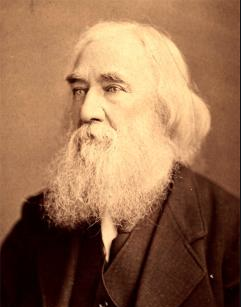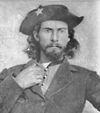The Principles on which the War was Waged by the North: Thoughts by Lysander Spooner

Most Americans see the Civil War as a settled issue: the clash put an end to slavery, saved the Union and ensured that “government of the people, by the people, for the people” did not “perish from the earth” (from the Gettysburg Address). However, some who lived through the conflict did not see the war as a success but, rather, as the triumph of tyranny. One may respond to this position by thinking that only a partisan Southerner would characterize the war in such terms, but in this case the critic was Massachusetts abolitionist, Lysander Spooner.
Spooner was a vocal opponent of the “peculiar institution” who wrote a work entitled The Unconstitutionality of Slavery (1845). His opposition to the war was not, therefore, a de facto support for slavery; his opposition was rooted in the ideas conveyed in the following introduction to an essay entitled, No Treason. This excerpt is valuable in that it presents a perspective about the war that though familiar to those who engaged in the conflict is mostly unfamiliar to our day.
August Glen-James, editor
The principle, on which the war was waged by the North, was simply this: That men may rightfully be compelled to submit to, and support, a government that they do not want; and that resistance on their part, makes them traitors and criminals.
The question of treason is distinct from that of slavery; and is the same that it would have been, if free States instead of slave States, had seceded.
On the part of the North, the war was carried on, not to liberate slaves, but by a government that had always perverted and violated the Constitution, to keep the slaves in bondage; and was still willing to do so, if the slaveholders could be thereby induced to stay in the Union.
The principle, on which the war was waged by the North, was simply this: That men may rightfully be compelled to submit to, and support, a government that they do not want; and that resistance on their part, makes them traitors and criminals.
No principle, that is possible to be named, can be more self-evidently false than this; or more self-evidently fatal to all political freedom. Yet it triumphed in the field, and is now assumed to be established. If it really be established, the number of slaves, instead of having been diminished by the war, has been greatly increased; for a man, thus subjected to a government that he does not want, is a slave. And there is no difference, in principle—but only in degree—between political and chattel slavery. The former, no less than the latter, denies a man’s ownership of himself and the products of his labor; and asserts that other men may own him, and dispose of him and his property, for their uses, and at their pleasure.
Previous to the war, there were some grounds for saying—in theory, at least, if not in practice—our government was a free one; that it rested on consent. But nothing of that kind can be said now, if the principle on which the war was carried on by the North, is irrevocably established.
If that principle be not the principle of the Constitution, the fact should be known. If it be the principle of the Constitution, the Constitution itself should be at once overthrown
—Lysander Spooner
